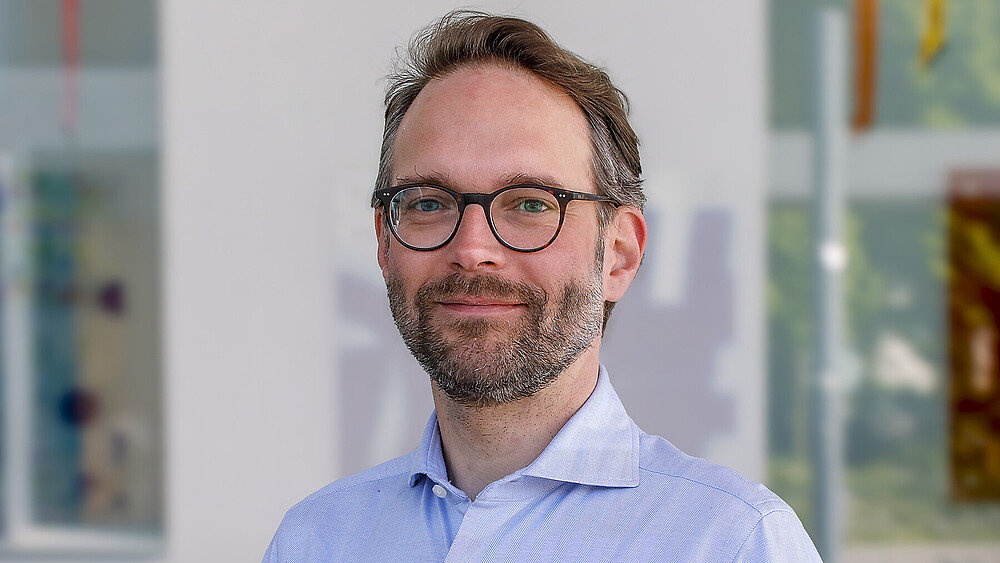A biotechnologist between research and teaching: Prof. Dr. rer. nat. Jörg Kretzschmar in conversation.

Prof. Dr. rer. nat. Jörg Kretzschmar has been working at the HSCG in the Faculty of Natural and Environmental Sciences in the field of environmental bioprocess engineering since autumn 2023. In this interview, he introduces himself and talks about his passion for his field of research.
Prof. Kretzschmar, what key stages have shaped your career to date?
I studied molecular biotechnology (B.Sc.) and environmental protection and spatial planning (Dipl.-Ing.) at the TU Dresden. After successfully completing both degrees, I had the opportunity to work as a research assistant in various areas of the DBFZ German Biomass Research Center in Leipzig for a total of 15 years. Most of the time I worked in the "Biochemical Conversion" department, where I mainly dealt with the optimization of the biogas process from a biochemical and process engineering point of view.
During this time, I established a close cooperation with the electro-biotechnology working group at the Helmholtz Center for Environmental Research in Leipzig. There, with the support of the Kurt Schwabe Institute for Measurement and Sensor Technology Meinsberg e.V. and the Chair of Physical Chemistry, Measurement and Sensor Technology at TU Dresden, I was also able to write a large part of my dissertation in the field of microbial electrochemistry. Specifically, I dedicated myself to the characterization of electroactive biofilms, which can be used as receptors for acetic acid biosensors in the biogas process. After completing my doctorate at TU Dresden, I was entrusted with the management of a working group at the DBFZ and later became deputy head of department.
What inspired you to pursue a career in science?
The decision was made during my first degree. I quickly became fascinated by the use of microbial processes in technical applications.
What brought you to Upper Lusatia and the Zittau/Görlitz University of Applied Sciences?
The opportunity to give back some of my knowledge to students as a professor at a university and to further my own education in the context of teaching and application-oriented research. And, of course, the landscape in the region and the proximity to the Czech Republic and Poland.
What are your main areas of work at the HSZG?
I teach the basics of process engineering, bioprocess and bioprocess engineering in the Molecular Biotechnology, Pharmaceutical Biotechnology and Ecology and Environmental Protection degree programs. I also give lectures and practical courses on environmental engineering and, in future, environmental bioprocess engineering in the Green Engineering and Environmental Sciences degree programs, among others. I am also trying to realize research projects and establish a new environmental bioprocess engineering laboratory.
Which research areas are particularly close to your heart and why?
The development of environmental biotechnological processes that can contribute to a future bioeconomy is particularly important to me. The biogas process and its sub-processes are an excellent example of how residual and waste materials or renewable raw materials can be used for the sustainable provision of energy or the production of chemicals.
In particular, I am fascinated by microbial electrochemical technologies, as they use bacteria to generate electricity as part of their metabolism or use electrochemistry to convert residual materials or bacterial metabolic products into high-quality chemicals. Microbial electrochemistry can be used to develop a range of novel technologies and processes that are in line with the basic principles of green chemistry. Unfortunately, there are no concrete large-scale applications yet, but microbial fuel cells, electrolysis cells and biosensors have already been demonstrated on a technical scale. I hope to be able to make a small contribution here with my research in the future.
How do you organize your teaching to get students interested in your subject?
I make my teaching as active and descriptive as possible. It's important to me that the students can visualize what I want to convey. That's why I try to incorporate as many practical examples as possible into my teaching.
What advice would you give to students who want to pursue an academic career (in your field)?
Be inspired and (sometimes) follow your gut feeling. It is important to be "on fire" for a subject or topic. In addition, of course, the more you have internalized the scientific basics, the better. I myself have spent a lot of time repeatedly learning the basics and still do to some extent today.
What are your best survival tips for exam time? What tricks do you have up your sleeve to master the exam in the best possible way?
Of course, regular attendance at lectures, seminars and practicals is fundamental. I think it's particularly important to be active, ask questions and question things. I also recommend regular sleep.
Which books do you really want to read this year?
Unfortunately only specialist books...I don't read very much in my free time (unfortunately).
Do you have any hobbies or interests that perhaps not everyone knows about?
I'm very interested in music and movies, especially the science fiction genre. I play in a band in my spare time.
What is your favorite place on campus or in the surrounding area?
Unfortunately, I haven't found one yet. But I like to go hiking in the Zittau Mountains when time allows.
The interview was conducted by the University Development and Communication Office, UAS Human Resources Department.